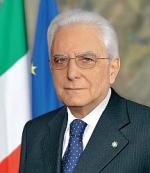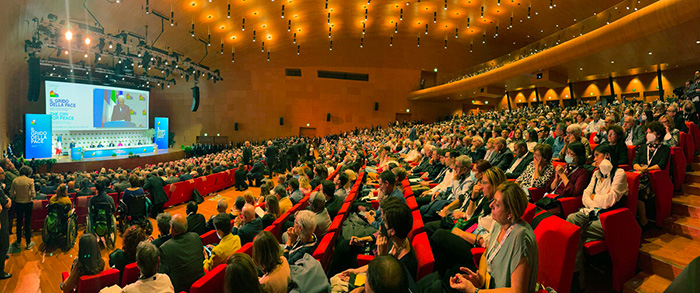Mattarella Sergio
President of the Republic, Italy

Born in Palermo on 23 July 1941, he has three children.
He has three children.
He graduated in Law in 1964 from Rome's 'La Sapienza' University with top marks cum laude, discussing a thesis on 'The function of political guidance'. He has been registered as a lawyer at the Court of Palermo since 1967.
He taught parliamentary law at the Faculty of Law of the University of Palermo until 1983, when he was placed on leave because he joined the Chamber of Deputies.
His scholarly activity and publications have mainly dealt with topics of constitutional law (intervention of the Sicilian Region in the economy, two-chamber government, legislative procedure, Parliament's inspection activity, expropriation compensation, evolution of the Sicilian regional administration, control over local authorities). Other publications have dealt with topics related to his parliamentary and governmental activities. He has delivered papers and speeches at conferences on legal studies and lectured in master's and postgraduate courses at various universities.
His political career originated within the Catholic-social and reformist movement. Elected deputy for the Christian Democrats in 1983 in the Western Sicily constituency, he was a member of the Chamber of Deputies until 2008.
In these seven legislatures, he was a member of the Constitutional Affairs Commission, the Foreign Affairs Commission and the Legislation Committee, of which he was also Chairman.
He was also a member of the Bicameral Commission for Institutional Reforms of the 11th legislature, of which he was Vice-Chairman, of the Bicameral Commission for Institutional Reforms of the 13th legislature, of the Parliamentary Commission of Inquiry into Terrorism and Massacres, and of the Parliamentary Commission of Inquiry into the Mafia. In the 15th legislature he was Chairman of the Jurisdictional Commission of the Chamber of Deputies.
In the 13th legislature he was Chairman of the Parliamentary Group of the Populars and Democrats (from the beginning of the legislature to October 1998).
From July 1987 to July 1989 he was Minister for Relations with Parliament. The reform of the organisation of the Presidency of the Council of Ministers and the abolition of the ordinary secret ballot in Parliament date back to those years. From July 1989 to July 1990 he was Minister of Education. The National School Conference (January 1990) and the reform of the primary school system, which, among other innovations, introduced the module of three teachers over two classes (Law No. 148 of 1990), date from that period.
From October 1998, he was Deputy Prime Minister until December 1999 when he was appointed Minister of Defence, a post he held until the June 2001 elections. In those years, he approved the law that abolished compulsory military conscription and the law that made the Carabinieri an autonomous armed force. In that phase, Italy developed an intense presence in peacekeeping missions deployed for UN initiatives and contributed significantly to interposition and peacekeeping operations in Bosnia-Herzegovina, Kosovo and the former Yugoslav Republic of Macedonia. The launch of the European Security and Defence Policy at that time saw Italy among the most convinced supporters, with the launch of, among other things, the first European army corps.
In the 2008 general election, he did not stand again and ended his political activity.
In May 2009 he was elected by Parliament as a member of the Presidential Council of Administrative Justice, of which he was Vice-President.
On 5 October 2011, he was elected as a Constitutional Judge by Parliament and was sworn in on 11 October 2011.
On 31 January 2015, he was elected the 12th President of the Republic.
On 29 January 2022, he was re-elected President of the Republic.
(October 2022)
Source: Presidency of the Italian Republic, https://www.quirinale.it/page/biografia
October 20 2020 17:20 | Piazza del Campidoglio
Ceremony begins

• Greeting message from the President of the Republic, Sergio Mattarella
PT | IT | EN
September 6 2015 17:00 | Congress Palace
Opening Assembly

• Message from Sergio Mattarella President of the Republic, Italy
IT | FR | EN

